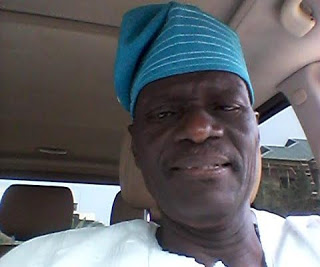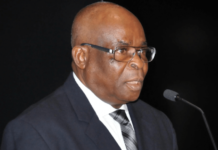
A Professor of Geography and
Environmental Management with the University of Ilorin, Kwara State, J. F. Olorunfemi has cautioned the Federal Government against
rushing to conduct another National Population Census (NPC) without
proper planning which includes carving the country into enumeration
areas and putting such in digital format.
Prof Funso Olorunfemi, in a paper,
entitled: “Population Census in the Spirit of Change”, argued that if
the administration of President Mohammadu Buhari desires true change
regarding the NPC, it should take cognisance of the need to properly
plan towards the next NPC in order to avoid errors of the past resulting
in inaccurate population data and eventual unequal distribution of
government’s presence across the country.
entitled: “Population Census in the Spirit of Change”, argued that if
the administration of President Mohammadu Buhari desires true change
regarding the NPC, it should take cognisance of the need to properly
plan towards the next NPC in order to avoid errors of the past resulting
in inaccurate population data and eventual unequal distribution of
government’s presence across the country.
He said: “The 1973 census was cancelled
and none in 1983. It took another 15 years for Nigeria to have the 2006
census. The census planned for 2018 may not be recommended. In the
spirit of ‘change’ and in this case change for the better, it will be
necessary for Nigeria to plan for, and conduct a national census of
housing and population that will be accurate and acceptable. This can
only be achieved if proper and adequate planning that include:
pre-censal activities, liaison with development partners, sensitization
of all stakeholders within and outside Nigeria, political commitment by
the Federal Government of Nigeria such that census in Nigeria will be
seen more as a technical exercise rather than a political enterprise. ”
and none in 1983. It took another 15 years for Nigeria to have the 2006
census. The census planned for 2018 may not be recommended. In the
spirit of ‘change’ and in this case change for the better, it will be
necessary for Nigeria to plan for, and conduct a national census of
housing and population that will be accurate and acceptable. This can
only be achieved if proper and adequate planning that include:
pre-censal activities, liaison with development partners, sensitization
of all stakeholders within and outside Nigeria, political commitment by
the Federal Government of Nigeria such that census in Nigeria will be
seen more as a technical exercise rather than a political enterprise. ”
Proposing that: ” the georeferencing of
all settlements in Nigeria and the use of large scale maps or satellite
image derivatives for enumeration area maps should be the minimum
acceptable standard, Olorunfemi noted that this will eliminate omission
and/or duplication of settlements, adding that : “Logistic support must
be provided for census officials on time, rather than their dependence
on local communities. The saying goes “that he who plays the pipe
dictates the tune… unless and until the entire country is properly
carved into enumeration areas and in digital format, a census should not
be encouraged. In view of the present economic circumstance of Nigeria,
a census may not be ripe until 2020/2021. There is therefore sufficient
time to plan for the next census,” he said.
all settlements in Nigeria and the use of large scale maps or satellite
image derivatives for enumeration area maps should be the minimum
acceptable standard, Olorunfemi noted that this will eliminate omission
and/or duplication of settlements, adding that : “Logistic support must
be provided for census officials on time, rather than their dependence
on local communities. The saying goes “that he who plays the pipe
dictates the tune… unless and until the entire country is properly
carved into enumeration areas and in digital format, a census should not
be encouraged. In view of the present economic circumstance of Nigeria,
a census may not be ripe until 2020/2021. There is therefore sufficient
time to plan for the next census,” he said.
Explaining what he meant by carving the
country into enumeration areas, he said: “What is generally done and
indeed feasible is to divide Nigeria into small units that can be
managed by canvassers during the census period. These canvassers are
called enumerators while these small units are called enumeration areas.
The basic thing therefore is to divide Nigeria into distinct and
exclusive enumeration areas through the process of enumeration area
demarcation (EAD) prior to, and far ahead of the census date. Thus,
adequate funding and logistics must be provided and utilized judiciously
ahead of the census, because this is an essential part of the
activities before a census”
country into enumeration areas, he said: “What is generally done and
indeed feasible is to divide Nigeria into small units that can be
managed by canvassers during the census period. These canvassers are
called enumerators while these small units are called enumeration areas.
The basic thing therefore is to divide Nigeria into distinct and
exclusive enumeration areas through the process of enumeration area
demarcation (EAD) prior to, and far ahead of the census date. Thus,
adequate funding and logistics must be provided and utilized judiciously
ahead of the census, because this is an essential part of the
activities before a census”
Speaking further, he said: “Once we have
divided the country into these units, we must then train the canvassers
or enumerators on what to do conscientiously on the census day(s). In
this case, they must record all specified information on all people
found within the allocated geographic space to be covered by the
enumerator(s). In that case, it does not matter where is who? Or who is
where? Technically, the identity of “who” is found “where” should be
documented. ”
divided the country into these units, we must then train the canvassers
or enumerators on what to do conscientiously on the census day(s). In
this case, they must record all specified information on all people
found within the allocated geographic space to be covered by the
enumerator(s). In that case, it does not matter where is who? Or who is
where? Technically, the identity of “who” is found “where” should be
documented. ”
The university don who drew attention to
the shortcomings of the last 2006 census as failing to capture true
population of the country, stressed the need for proper training of
officers and monitoring of their activities during the gathering of
data. He gave other solution to ineffective conduct of NPC, thus:
“Digital imageries should be acquired for EA demarcation. All EAs must
be geo-referenced and edge matched to allow for storage in a Geographic
Information System database. The advantage of this cannot be
over-emphasized. One of which is the ability to store, retrieve and link
to other attribute data within a national frame that can be used for
future censuses. I learned that NPC may even require biometric data! To
this, I have my reservations.”
the shortcomings of the last 2006 census as failing to capture true
population of the country, stressed the need for proper training of
officers and monitoring of their activities during the gathering of
data. He gave other solution to ineffective conduct of NPC, thus:
“Digital imageries should be acquired for EA demarcation. All EAs must
be geo-referenced and edge matched to allow for storage in a Geographic
Information System database. The advantage of this cannot be
over-emphasized. One of which is the ability to store, retrieve and link
to other attribute data within a national frame that can be used for
future censuses. I learned that NPC may even require biometric data! To
this, I have my reservations.”
Nigerian News Direct











